A lot of WordPress users ask us if it would be good to open their blogs to guest contributors. It’s a question we’re very familiar with, having been on both sides of the fence.
Although we stopped accepting guest posts, don’t let that discourage you. We think it can be a fantastic strategy for certain types of blogs, especially at specific growth stages.
Guest posts can definitely offer fresh perspectives and might even help expand your network within the industry. But, there are considerations to keep in mind, like ensuring quality and relevance.
In this article, we’ll share our insights on the pros and cons of accepting guest posts on your WordPress blog. By the end, you’ll learn exactly what factors to consider before opening your site to guest authors.
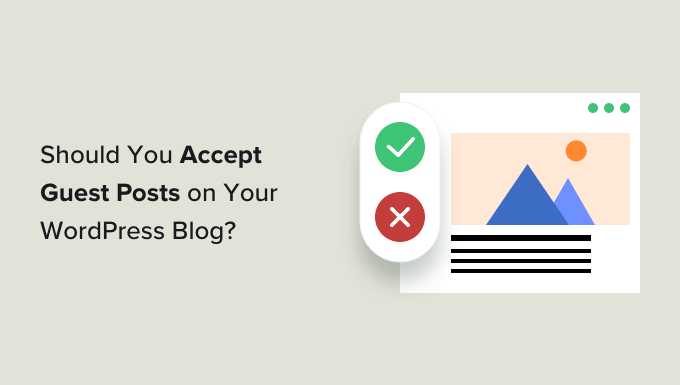
What Are Guest Posts?
Guest posts, also known as guest blogs, are a type of user-generated content. They’re crafted by contributors who aren’t officially part of your website’s team.
Guest blogging is a beloved content marketing strategy. It helps individuals build quality backlinks, raise brand awareness, and establish a reputation. Simply type ‘write for us’ into your favorite search engine, and you’ll find plenty of opportunities.
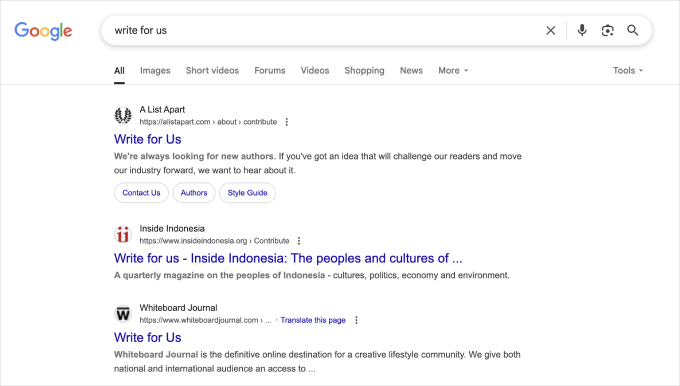
Guest bloggers often aim to promote their products or services. They may showcase their offerings within the post or include a backlink in their author bio to boost their website’s domain authority.
Other contributors use guest blogging to build their credibility as industry leaders by writing for reputable sites like yours. It also helps them widen their network and engage with other bloggers within similar niches.
Ultimately, choosing to accept guest posts on your WordPress blog is a big decision. To help you make the right choice, let’s explore the pros and cons of allowing guest contributions on your platform.
You can use the quick links below to navigate through this article:
Pros of Accepting Guest Posts on Your WordPress Blog
Some of the best WordPress blogs accept guest posts. Our research found that 42% of B2B marketers do guest posting, so there’s no denying its benefits.
With that in mind, here’s why you may want to accept guest blogs on your own site.
1. Save Time and Resources on Content
Creating blog posts takes time and effort. If you are a solo blogger or a new business, then you may struggle to publish new content regularly.
Guest bloggers can supply you with new and interesting content and help keep your blog fresh. By regularly publishing guest posts on your website, you can improve your WordPress SEO and keep people coming back to your blog.
Even better, you can do this without having to hire extra writers or taking time out of your busy schedule to blog.
Scouting for high-quality guest bloggers and editing submissions can take time, but it’s often much faster than writing the post yourself. There are also ways to effectively find guest bloggers, which can save you even more time.
To start, you can create a ‘write for us’ page so potential bloggers can read your guest post guidelines. This should include information like formatting rules and the kind of content you are interested in publishing.
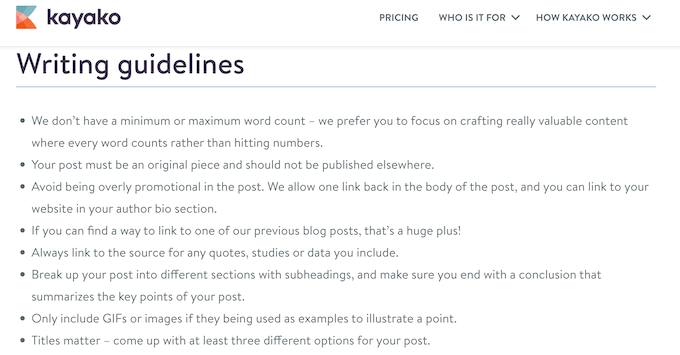
This should define the quality of the guest posts you get while also helping you avoid answering the same questions over and over again.
The easiest way to create a ‘write for us’ page is by using SeedProd. This WordPress page builder plugin comes with more than 300 professionally designed templates and ready-made blocks that allow you to create an eye-catching ‘write for us’ page, fast.
It’s also our go-to page builder for creating custom pages at WPBeginner and our partner companies’ landing pages. Read our full SeedProd review to learn more.
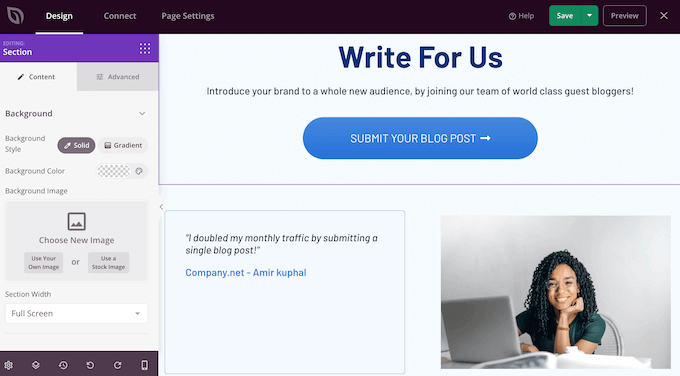
After creating this page, you should add it to your site’s main navigation menu so visitors can find it easily.
We also recommend allowing users to submit posts using a form.
We recommend using WPForms, which is the best form plugin for WordPress. At WPBeginner, we rely on it for everything from contact forms to our annual user surveys. See the full scope of what it can do by reading our complete WPForms review.
WPForms also comes with a post submission add-on that allows guest bloggers to upload content to your blog.
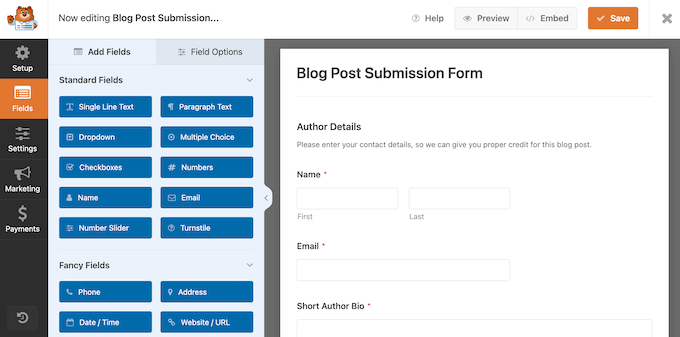
That way, you can automate the submission process and save yourself a ton of time.
For more information, please see our guide on how to allow users to submit posts on your WordPress site.
2. Reach a New Audience
When you publish the work of a guest blogger, the author will most likely share that post on their platforms. Our blogging research has shown that 90% of bloggers promote their posts on social media.
Other than that, they may add it to their email newsletter or even write about the guest post on their own site.
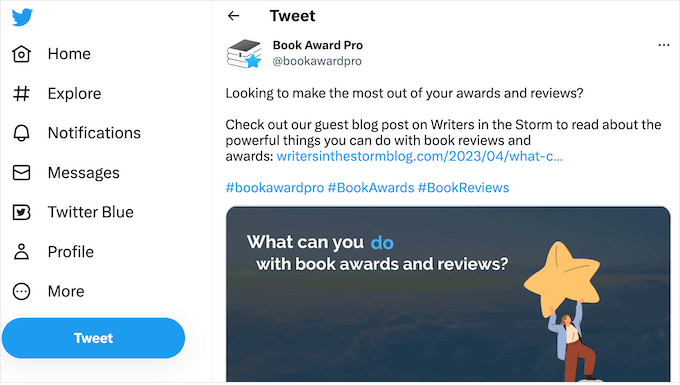
This is an entirely new target audience who may be learning about your site for the first time. If these people like what they see, they may become regular readers or even customers.
With that in mind, it’s a good idea to tell the guest blogger when you publish their post so they can start promoting it right away.
Additionally, you can set up an email notification to let the blogger know when the post is in ‘Pending Review’ status so that they are aware of the editorial timeline.
You might even share your Google Analytics data with them so they know what actions are driving the most traffic to their blog. The guest writer can then fine-tune their actions to get you even more visitors.
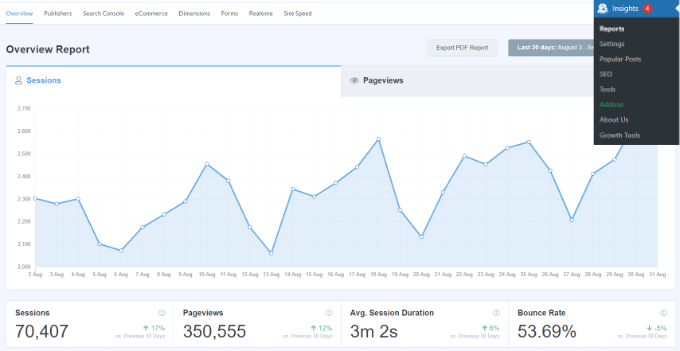
For more information, please see our guide on how to track user engagement in WordPress with Google Analytics.
3. Share a Unique Perspective
If you are running out of blog ideas, then guest blogging is a great way to find new inspiration and offer a different type of content to your audience.
For example, you can encourage guest bloggers to write about their own experiences. Or, talk about a topic that typically generates lots of debate or even controversy.
Doing this can get more comments on your WordPress blog. In the best-case scenario, the guest post might even go viral and increase your blog traffic.
Although you want guest posts to stand out, they should still fit with the rest of your content. That said, it’s smart to publish a detailed style guide that guest bloggers can follow.
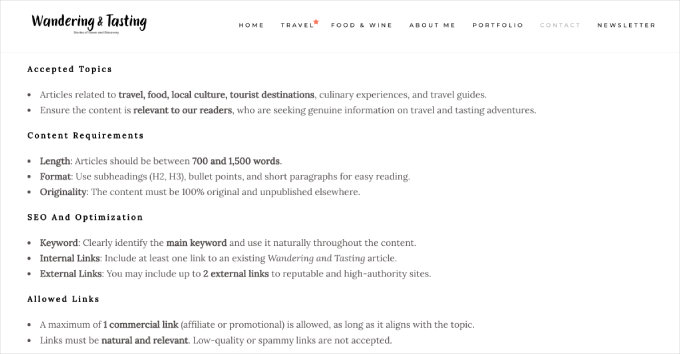
If you have a ‘wish list’ of topics for guest bloggers, then you can add them to your guidelines. This helps bring fresh opinions to your blog while keeping things consistent for your regular readers.
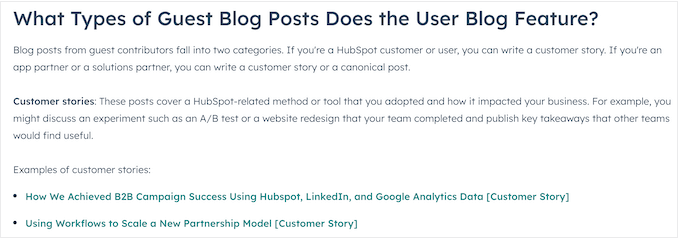
4. Connect With Industry Professionals
Accepting guest posts on your WordPress blog can open doors to valuable relationships within your community.
This networking might lead to opportunities like speaking at events and conferences. Even casual conversations with industry figures on social media can boost your business buzz and increase visitors.
When potential customers see you engaging with respected figures online, it enhances your reputation. This may potentially drive more sales and conversions.
While newer blogs might find it challenging to attract big-name guest posters, remember that today’s smaller bloggers could be tomorrow’s stars. A guest post you published months or years ago might gain traction if its influence grows.
If you’re lucky, these authors will remember your early support. Such connections can become crucial industry contacts, offering significant opportunities for your business.
5. Improve Your Reputation
When someone guest blogs for your website, people tend to see it as an endorsement. These guest bloggers are saying they like your brand and want to be associated with you.
In this way, accepting guest posts on your WordPress blog can build your reputation and social proof as a respected member of the community.
With that in mind, we recommend trying to get guest blogs from industry experts and leaders in your field. [Add something DR to help choose reputable blogs].
Also, note that the endorsement goes both ways. You are also sort of endorsing the writer, too, by having them on your site. So, it pays to be mindful of who you choose to write for you.
5. Improve Your Reputation
When someone guest blogs for your website, it’s often seen as an endorsement. These guest bloggers are showing they appreciate your brand and want to be associated with you.
By accepting guest posts on your WordPress blog, you can enhance your reputation and build social proof as a respected community member.
With this in mind, try to secure guest posts from industry experts and leaders. You can check a potential guest blogger’s Domain Rating (DR) to see how authoritative their site is. A DR over 50 shows they’re well-respected online, which can enhance your site’s credibility.
You can use tools like Moz’s Free Domain Authority Checker to evaluate a site’s DR. Simply type in the site’s URL to check its score.
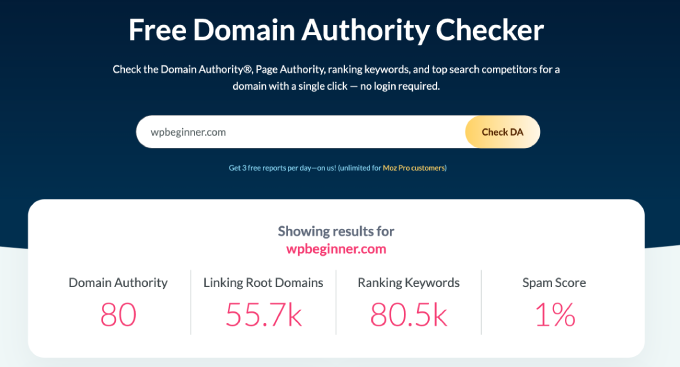
This tool provides insight into the domain’s authority, helping you make informed decisions about collaborating with potential guest bloggers.
Remember, the endorsement goes both ways. By hosting their content, you are also endorsing the writer. Therefore, it’s important to carefully select who you choose to write for your site.
Cons of Accepting Guest Posts on Your WordPress Blog
While accepting guest posts offers benefits for certain WordPress websites, it may not be the right strategy for all sites.
With that being said, here’s why you might not want to accept guest blogs.
1. Create More Spam for Your Website
One of the biggest issues of accepting guest posts is spam, especially if the blogger is unknown or comes from an unverified source.
When you accept guest post outreach using a form, spammers may send repeated guest post requests that include irrelevant or low-quality content with backlinks to their spam blogs (splogs).
Or worse, the content is malicious and can harm your site’s security and SEO.
Reading through guest post submissions takes time and effort, so these spammy posts can slow down your editorial workflow.
Using a plugin with built-in spam protection like WPForms is a great start to protect your website from automated spam bots.
It includes powerful features like reCAPTCHA and custom CAPTCHAs to ensure that only real bloggers can submit a guest article request.
That said, it’s always good to stay vigilant. For more information, check out our guide on how to combat spam in WordPress.
2. Cause Duplicate Content Issues
Guest bloggers often try to promote their products, services, or brands by submitting to as many blogs as possible.
This means you may get a submission that’s already been published elsewhere. You may even publish a guest post, only for that content to appear on another website later.
This isn’t your fault, but the duplicate content can impact your SEO. Search engines such as Google often remove duplicate guest blogs from their search results, so you may struggle to get traffic.
Even if the duplicate content appears in the search results, you are still sharing visitors with everyone else who’s published the same guest blog.
To avoid duplicate content, you should add an originality clause to your ‘write for us’ guidelines.

This section should say you only accept submissions that haven’t been published elsewhere, including on the writer’s own website.
You should also make it clear that once you accept a post, the writer must stop submitting it to other websites.
However, there’s no guarantee that guest bloggers will follow your guidelines. With that in mind, you may want to check whether a submission has already been published.
You can simply paste some of the content into Google search and see whether you get any matching results.
After publishing a guest post, you can monitor whether it shows up on other sites. For more on this topic, please see our guide on how to easily find and remove stolen content.
3. Receive Low-Quality AI-Generated Content
Some bloggers may be more interested in publishing lots of guest posts, fast, rather than sending you quality content. This is because they may want to do link-building to increase their website’s domain authority.
With that in mind, you may get some guest posts created by AI content generators.
Guest bloggers simply need to provide AI or ChatGPT writing prompts. The artificial intelligence program will then go through lots of publicly available information to create a guest blog post for your website.
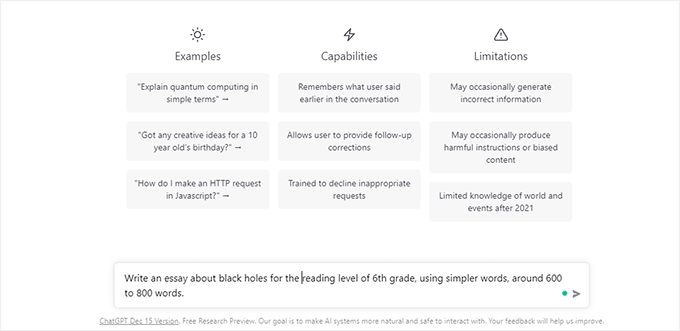
This can be a way to create lots of guest posts quickly, but there are some big problems for blog owners.
Firstly, there’s no guarantee that all the information these artificial intelligence plugins and tools use is accurate, so you may publish a guest post that includes completely false information.
Many AI-powered tools, such as ChatGPT, are also designed to be impartial and unbiased. This means the guest post may feel bland and uncreative, with very little passion or enthusiasm for the guest blog’s topic.
As AI generators get more sophisticated, you may find it difficult to spot guest blogs that are written by auto-blogging tools.
However, researchers at Google have worked for years to detect content generated by artificial intelligence tools. In the past, they have penalized websites for publishing AI-generated content.
With that in mind, publishing guest blogs written by artificial intelligence may hurt your WordPress SEO, even if you didn’t realize the post was written by AI.
One of the easiest ways to see if a blog post is AI-generated is to use an AI content detector. For some tool recommendations, check out our list of the best AI content detectors for writers and site owners.
Also, read our tips on editing AI-generated content so that your guest posts always sound unique and human.
4. Receive Poorly-Written Guest Blogs
By publishing detailed and helpful guest author guidelines, you can ensure most of the posts you receive are high-quality. However, there’s always a chance that you may get guest posts that don’t meet your editorial standards.
Depending on the quality of the guest posts, editing can take a lot of time. You’ll also need to spend time on other tasks, such as optimizing the post’s images.
Thankfully, there are SEO tools that can help you edit guest posts fast like All in One SEO (AIOSEO). It’s what we use at WPBeginner to make sure our WordPress content is SEO-friendly.

AIOSEO is the best SEO plugin for WordPress and provides actionable suggestions for how to improve a blog post’s SEO. Read our detailed AIOSEO review to learn its full features.
This includes optimizing images for search engines by automatically setting your alt text, image titles, captions, and more.
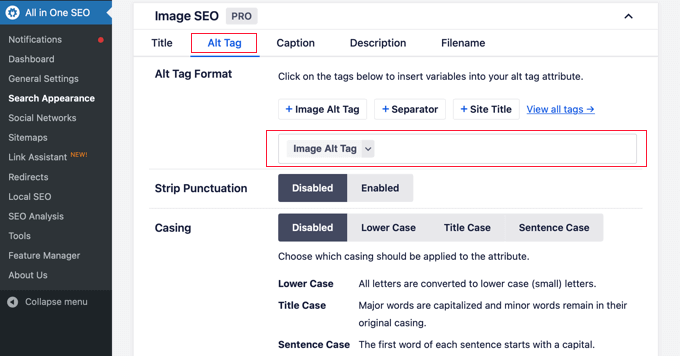
You can simply type in the keyword you want to rank for, and AIOSEO will analyze the guest post for that keyword.
It will then show you a score and give suggestions on how to improve your ranking for that specific keyword.

For more information, please see our guide on how to set up AIOSEO for WordPress.
Other than that, we recommend using SEOBoost, which is a content optimization tool that we also use.
It can analyze the top-ranking content in your target keyword, recommend LSI keywords to include in your content, and identify areas for improving your content based on data.
You can use this to make your guest post briefs so that your guest writers can create more SEO-friendly content. It’s also possible to use it to edit your writers’ articles and make sure they’ve nailed all your SEO requirements.
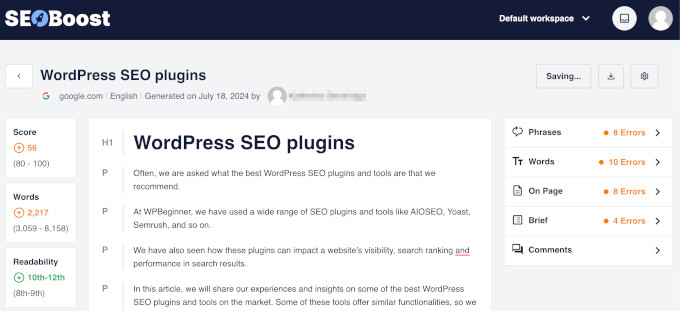
Accepting Guest Posts in WordPress: Frequently Asked Questions
Now that we have discussed the pros and cons of accepting guest posts, let’s answer some frequently asked questions about guest posting.
Is guest posting safe for SEO?
Yes, as long as the guest post content sticks to SEO best practices, guest posting is safe for SEO. It can be a great way to create unique original content that’s beneficial for your audience, which is what Google values.
Does Google penalize guest posts?
Google may penalize a guest post when:
- It contains excessive keyword-related backlinks to the guest author’s website.
- If the same article is published across multiple websites.
- If the article does not follow E-E-A-T standards.
- If the backlink to the guest contributor’s site is not marked as ‘nofollow.’
You can read more about this in the Google Search Central blog.
Note: To help you meet Google’s E-E-A-T content guidelines, you can use the AIOSEO plugin, which comes with a powerful Author SEO addon.
The Author SEO addon allows you to showcase the trustworthiness of your writers by adding details like education, employer, job title, and topics of expertise to their author bios. You can also add a Reviewer block to show that your guest posts have been fact-checked and are accurate.
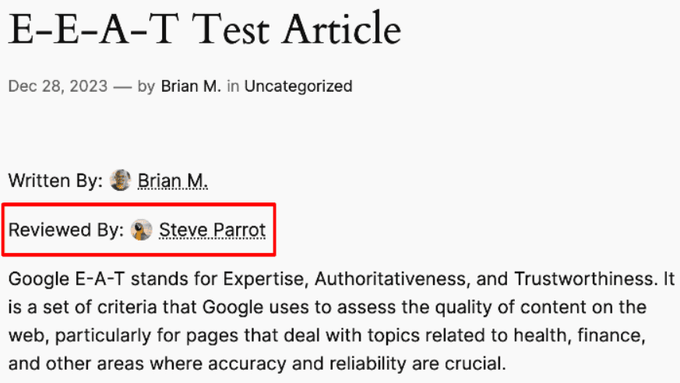
Adding these E-E-A-T signals to your guest posts will help search engines easily identify your credentials, which results in higher rankings.
Is guest posting legal?
Yes, guest posting is legal. In fact, many digital marketing agencies offer guest posting services to build their clients’ domain authority. That said, it’s always best to look for companies with a good reputation for offering these services to avoid Google penalties.
Final Verdict: Should You Accept Guest Posts in WordPress?
You should accept guest posts if you need help with content creation as they can lighten your workload and bring in fresh perspectives. Plus, it’s a great way to network and build relationships.
However, there are some big drawbacks you need to be aware of. In particular, duplicate content and spammy posts can hurt your SEO and your reputation as a respected website.
Of course, using the right tools can help you avoid many of the drawbacks while still getting all of the benefits.
With its spam protection, WPForms can ensure that most guest post submissions are legit. On the other hand, AIOSEO and SEOBoost can help you speed up the blog post optimization process.
We hope this tutorial helped you decide whether to access guest posts on your WordPress blog. You may also want to learn the best blogging niches that will make money or check out our expert pick of the must-have WordPress plugins for business websites.
If you liked this article, then please subscribe to our YouTube Channel for WordPress video tutorials. You can also find us on Twitter and Facebook.





Raman raman
well written …Thank you for sharing
WPBeginner Support
You’re welcome!
Admin
Kushal Phalak
Nicely written! As for a beginner, do you recommend any ways to approach for writing guest posts on other authoritative sites, and to help create high quality backlinks? I recall that cold emails is one approach, but I feel like they somewhat decreases the brand value of my blog, and most of the big sites do not approve.
WPBeginner Support
We would first recommend checking if a site has a write for us section or a section on guest posts as that normally covers how guest posts are treated for a site.
Admin
Kushal Phalak
Thanks, I will look into it!
Ralph
I think it has more negatives than positives. If you are a blogger building a personal brand, your readers don’t care about guess posts and can find them more like placeholders rather than a normal posts. Just because you are not there, you are not the author.
I think a better idea is to present the topic in the form of an interview.
You can only ask questions, so work is minimal, but still, readers consider that you are there, that it was your publication. Even if 99% of the content is made by someone else.
Jiří Vaněk
Thank you for the pros and cons. I did consider hosting articles for a while, but in the end, I decided I’d rather have my website as my own brand. However, lately, I’ve been thinking more about writing guest posts somewhere else to at least create quality backlinks for myself.